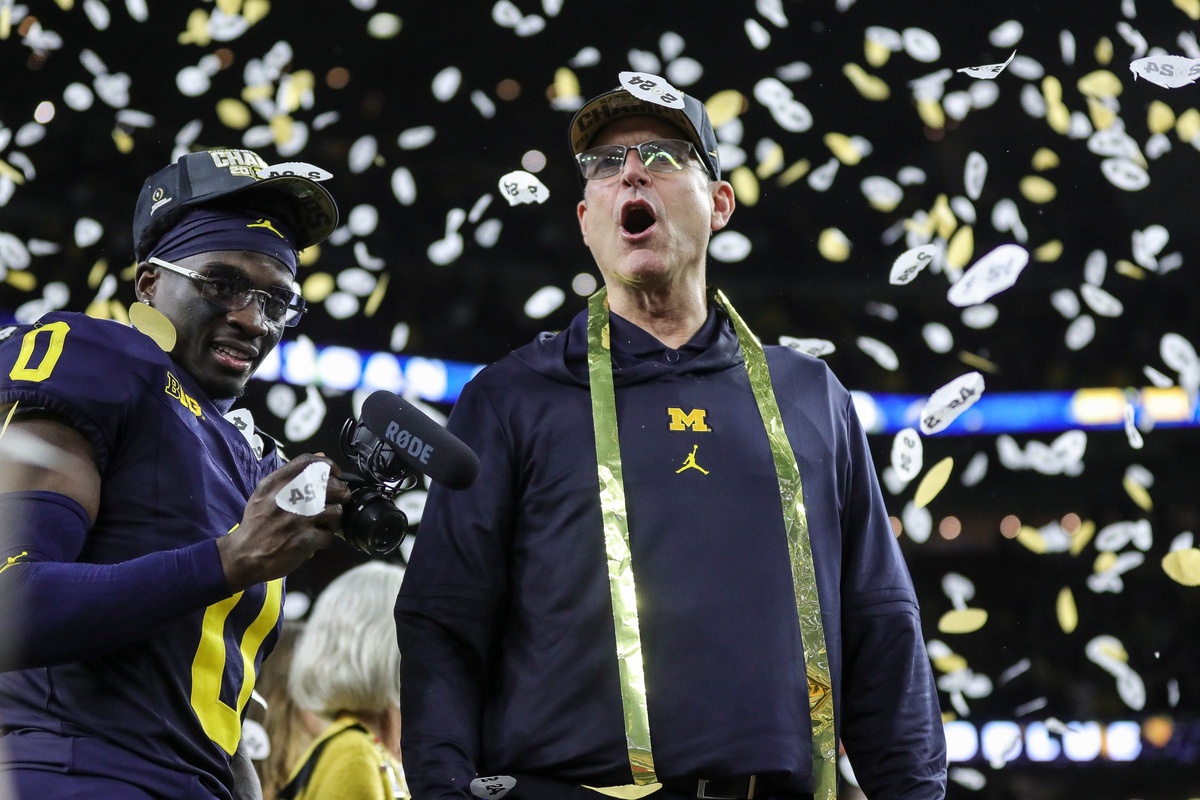Jim Harbaugh guided the Michigan Wolverines to the top of the collegiate mountain, defeating the Washington Huskies 34-13 in the College Football Playoff National Championship last year. Yet, just a couple of weeks later, he left the program for the same role with the NFL’s Los Angeles Chargers.
Was it simply a desire to return to the professional football ranks, or did deeper motivations fuel Harbaugh’s departure from Ann Arbor?

Jim Harbaugh Left Michigan in Utter Disarray
This summer, the NCAA served Harbaugh a four-year show-cause order and suspended him for one season.
If a collegiate program hires him during the four years, he will have to sit out an entire season and would be “barred from all athletically related activities, including team travel, practice, video study, recruiting, and team meetings” until his show-cause order is fulfilled.
The punishment was unrelated to the NCAA’s ongoing sign-stealing investigation into the Wolverines’ program. Instead, it revolved around Michigan’s recruiting violations during Harbaugh’s tenure as head coach.
The NCAA found the program conducted in-person recruiting during the COVID-19 dead period, had impermissible tryouts involving recruits, and exceeded the number of coaches allowed in practice.
As a result, Michigan will endure a three-year probation, recruiting restrictions, and an unspecified fine. The Big Ten suspended Harbaugh for three games and then-offensive coordinator Sherrone Moore for one to begin last season as part of a negotiated resolution with the NCAA.
However, Harbaugh was not part of an earlier agreement with the governing body that allowed other staffers to begin serving their penalties immediately.
While Harbaugh is focused on leading the Chargers to their first playoff win since 2018, the Wolverines still await a Notice of Allegations regarding the alleged sign-stealing investigation.
MORE: 2024 College Football Power Rankings
Harbaugh was adamant that he had nothing to apologize for after being asked about his role in the scandal:
“No one’s perfect. If you stumble, you apologize, and you make it right. Today, I do not apologize. I did not participate, was not aware, nor complicit in those said allegations. So for me, it’s back to work and attacking with an enthusiasm unknown to mankind.”
Sign-stealing is not specifically prohibited, but off-campus, in-person scouting of future opponents is illegal. Michigan was accused of purchasing tickets to scout future opponents and sending staffers to those games to digitally record teams signaling their plays.
Nevertheless, the NCAA punishments may not even be the worst thing Harbaugh left Michigan to deal with. QB J.J. McCarthy also left for the NFL in the offseason, as the Minnesota Vikings selected him No. 11 overall in the draft.
That left the Wolverines with Davis Warren, Alex Orji, and Jack Tuttle as the top three QBs on the depth chart. The result has been disastrous, with the three combining for a 61.4% completion rate, 5.6 yards per attempt, 11 touchdowns, 10 interceptions, and a 6-5 record.
But it’s not just the QB play. Michigan lost 18 transfers while bringing in nine, four of whom have rarely seen the field in 2024. Losing Harbaugh, much of his staff, and a contingent of starters to the NFL hurt the program’s appeal to prospective players, but the Wolverines also don’t use NIL in that way.
Although most blueblood programs have deep NIL wallets and aren’t afraid to open them up in the transfer portal, Michigan tends to hold onto money for the players already in the program instead of using it to recruit reinforcements.
Harbaugh Returned to His Roots in the NFL
After starring as a QB at Michigan, Harbaugh heard his name called with the No. 26 pick of the 1987 NFL Draft. He went on to play 14 seasons in the league, finishing with a 58.8% completion rate, 26,288 passing yards, 129 TDs, and 117 INTs.
Shortly after retiring from his playing career, Harbaugh followed in his father’s footsteps and entered the coaching realm. His first role came with the Las Vegas Raiders as a QBs coach, but he quickly became the head coach at San Diego (2004-06) and the Stanford Cardinal (2007-10).
MORE: Simulate the College Football Season With CFN’s College Football Playoff Predictor
From there, Harbaugh left for his first stint as an NFL head coach, leading the San Francisco 49ers for four years. He received Coach of the Year honors in 2011 and even took the franchise to the Super Bowl in 2013, where they lost to his brother, John Harbaugh, and the Baltimore Ravens.
That wasn’t the first “Harbaugh Bowl,” as the Ravens also defeated the 49ers in 2011. Yet, it wasn’t the last, either, as the two brothers will clash once again in Week 12 of the NFL season. This time, Jim will lead the 7-3 Chargers against John’s 7-4 Ravens in what should be one of the most entertaining Monday Night Football matchups of the season.
College Football Network has you covered with the latest from the ACC, Big Ten, Big 12, SEC, and every Group of Five conference and FBS Independent program.

